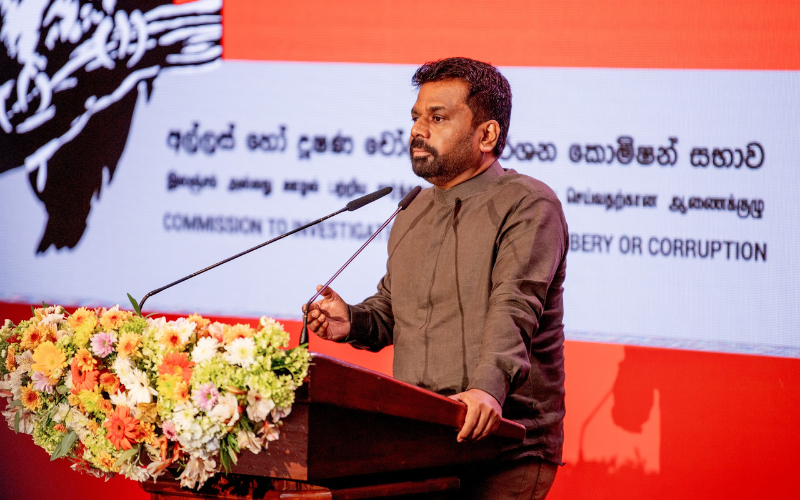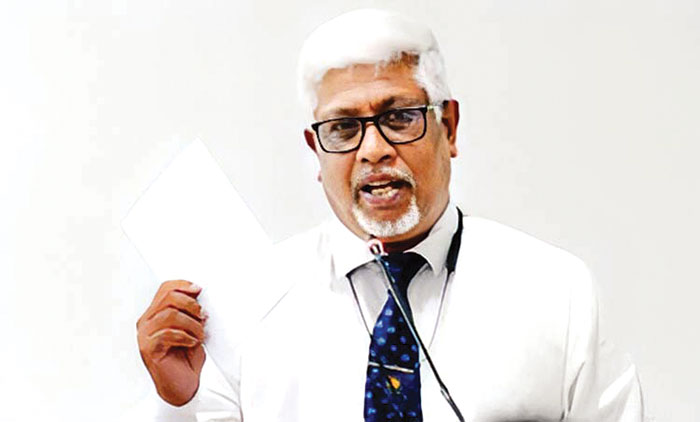News
SLPP defends PTA, calls for probe into ‘terror’ angle

“Who takes responsibility for the destruction of over 70 MPs’ houses, 600 other properties?”
By Shamindra Ferdinando
General Secretary of the ruling Sri Lanka Podujana Peramuna (SLPP) Sagara Kariyawasam, MP, yesterday (23) said that there should be no holds barred investigation into violence in the run-up to the May 09 incidents, at Galle Face, and outside Temple Trees, and after the resignation of the then Premier Mahinda Rajapaksa.
SLPP National List MP and Attorney-at-Law Kariyawasam strongly defended the utilization of the Prevention of Terrorism Act (PTA) to deal with some of those who had been arrested, in connection with incidents, related to the so-called public protest movement.
Kariyawasam said so in response to Opposition political parties, a section of the diplomatic community, as well as some local and foreign NGOs, condemning the issuance of detention orders in terms of the PTA.
Referring to detention orders issued in respect of three persons, including Wasantha Mudalige, convenor, Inter-University Students’ Federation (IUSF), affiliated to the Frontline Socialist Party (FSP), lawmaker Kariyasawam said that interested parties had quite conveniently forgotten the destruction of houses, and other properties, belonging to one-third of lawmakers, killing of Polonnaruwa district SLPP MP Amarakeerthi Atukorale, and causing grievous injuries to Kalutara District MP Kumara Welgama.
How could a public protest campaign, dubbed as peaceful, destroy houses and other properties belonging to as many as 72 MPs, within a matter of 24 hours, lawmaker Kariyawasam asked. Almost all of them were members, elected on the SLPP ticket, MP Kariyawasam said. The SLPP parliamentary group consists of 145 members.
The SLPP official pointed out that a month later the protest movement destroyed the then Premier Ranil Wickremesinghe’s private residence,at 5th Lane, Kollupitiya.
When The Island pointed out that violence erupted at an unprecedented scale, only after the then government unleashed UPFA goons against those protesting at Galle Face and outside Temple Trees, lawmaker Kariyawasam said that peaceful public protest campaign couldn’t have stormed so many guarded houses, meticulously, across the country.
In fact, organized groups attacked residences of five SLPP lawmakers, less than a week before the May 09 eruption, MP Kariyawasam said. Among those who had been attacked were Gamini Lokuge (Colombo district), Ramesh Pathirana (Galle district) and Roshan Ranasinghe (Polonnaruwa district), lawmaker Kariyawasam said.
Responding to another query, MP Kariyawasam asserted that police, in consultation with Foreign and Defence Ministries, should brief the diplomatic community of the actual situation. They should be provided with video footage of the destruction caused by organized gangs, MP Kariyawasam said, adding that as many as 600 other properties, belonging to ex-Provincial Council and Local Government members, were attacked.
The MP said that those who had been so concerned about the arrests and detention of suspects, including in terms of the PTA, never bothered to condemn the lynching of Amarakeerthi Atukorale, in the Nittambuwa police area. The first time entrant to Parliament was lynched, along with his police bodyguard, on the evening of May 09, at Nittambuwa, MP Kariyawasam said. MP Welgama was almost killed at Makumbura, Kottawa, the top SLPP official said, alleging that the whole operation must have been planned over several weeks, if not months, in advance.
Lawmaker Kariyawasam stressed that groups of motorcyclists, wearing full face helmets, led the attacks. Having failed to protect the residence of MPs and Local Government representatives, the police shouldn’t absolve themselves of the responsibility for apprehending those responsible for violence.
The MP said that violent elements obviously exploited the extreme economic difficulties, experienced by the public ,to stage violence.
The SLPP General Secretary said that law enforcement authorities, and intelligence services, should conduct a thorough inquiry. The then Minister Dinesh Gunawardena alleged, in Parliament, the deployment of drones to monitor targeted properties, including his own, whereas former MP M.M. Zuhair, too, made reference to the use of such technology in the well calculated operation, the MP said.
Lawmaker Gunawardena said that President Ranil Wickremesinghe declared Emergency in line with the overall strategy to meet the threat. The MP said that he couldn’t comprehend why some of those, whose properties were senselessly destroyed, voted against the Emergency, thereby played into the hands of those seeking to subvert the country.
Lawmaker Kariyawasam said that the role, played by the Bar Association of Sri Lanka (BASL) in the public protest movement, was questionable. The politician said that he raised the issue, as a member of Parliament, and an attorney-at-law. Instead of taking, what he called, a balanced view, the BASL has thrown its weight behind the violent protest campaign, with some members acting in a manner completely contrary to the oaths taken by them, lawmaker Kariyawasam said.
Declaring that the SLPP elected UNP leader Wickremesinghe to complete the remainder of President Gotabaya Rajapaksa’s term, as there was no alternative, lawmaker Kariyawasam alleged the country was about to succumb to terrorism when the ruling party stepped in. Unfortunately, some of those elected, and appointed on the SLPP ticket, and National List, respectively, conspired against their own government.
Lawmaker said that those who asked the then President Gotabaya Rajapaksa to quit, behaved in a treacherous manner and were still pursuing the same strategy. The SLPP official emphasized that the so-called rebel group shouldn’t expect the ruling party to nominate any of them for positions in Parliament as in terms of the Standing Orders. “Positions will be shared by the government and the Opposition. There is absolutely no space for those who operate as independent MPs,” the SLPP General Secretary said, urging all political parties, represented in Parliament, not to condone violence, at any level.
The lawmaker pointed out that even the rebel group was sharply divided over the contentious matter of President Wickremesinghe declaring Emergency.
Latest News
Enforcing the law against bribery and corruption is not an act of political revenge but a profound human responsibility – President

President Anura Kumara Disanayake emphasized that since assuming office, the current government has taken decisive steps to free the process of combating bribery and corruption from political interference. He reiterated that while the political mechanism has been liberated from engaging in such crimes, it is now the responsibility of the administrative machinery operating beneath that political structure to fall in line and correct its course without delay.
He explained that a grace period of six months has already been provided for the state officials to adjust to this new direction. The President firmly warned that if the public service mechanism fails to act appropriately within this period, the government will not hesitate to take firm legal action against those officials from May onwards.
President Disanayake expressed these views on Wednesday (09), participating in the launch of the National Anti-Corruption Action Plan 2025–2029, held at the Bandaranaike Memorial International Conference Hall (BMICH) in Colombo.
Bribery and corruption have proliferated, undermining the integrity and values of the country’s state institutions .He observed that over the past six months of the present government, no section of the public service has been allowed to collapse and that if officials continue to resist change, the government will proceed to remove and replace them after May.
The President pointed out that bribery and corruption have caused the nation to fall behind for decades in the eyes of the world. He reiterated that enforcing the law against these crimes is not an act of political revenge but a profound human responsibility.
The President stressed the need to build a society that respects the law and fears wrongdoing, adding that conducting lectures or workshops alone would not suffice in achieving this goal. He emphasised that people must practically witness that any person who commits a crime will be subjected to punishment under the law.
President Disanayake noted that corruption in Sri Lanka ranges from minor bribery, from the village level to bringing poor quality medicinal drugs. Bribery and corruption have escalated from minor instances to grave financial crimes, extending from local councils to looting the Central Bank.
The President further said that previous rulers safeguarded and protected those engaged in corrupt activities.
He also revealed the emergence of a network of thieves within several state administrative institutions and certain bodies responsible for enforcing the law, comprising underworld elements involved in bribery and corruption. He confirmed that these criminal networks have already been identified and assured that measures will be implemented in the future to dismantle and eliminate them.
President Disanayake solemnly pledged that the responsibility of eradicating bribery and corruption will not be passed on to the next generation but will be resolved within this generation itself, under the leadership of the present government.
Drawing a comparison with India, which gained independence a year before Sri Lanka, the President noted that through a consistent national policy framework, India has successfully achieved space exploration and built a massive workforce in the software industry. In stark contrast, he pointed out that Sri Lanka, due to poor decisions made by its political leadership, was declared a bankrupt state in 2022.
He further stated that the current government has taken on the responsibility of leading Sri Lanka towards the international stage through a national policy framework that ensures transparency and accountability for every rupee spent from public funds.
The President added that by implementing this framework, it is possible to build public trust in law enforcement and judicial institutions and that it must be made clear to the people that there will be no mechanism available for anyone to escape the law after committing a crime.
He stated that the purpose of the National Anti-Corruption Action Plan 2025-2029 is to guide the country towards becoming a nation of integrity. The government plans to establish Internal Affairs Unit within all state institutions including the Presidential Secretariat and implement a system for monitoring these units through digital technology to ensure accountability and transparency.
The Action Plan has been designed around four key strategic priority areas: prevention and public participation, institutional strengthening and the enforcement of law along with reforms in law and policy.
The President highlighted that eliminating bribery and corruption is one of the most decisive factors in a country’s development and progress. In Sri Lanka, the Commission to Investigate Allegations of Bribery or Corruption (CIABOC) has been identified as the leading state institution entrusted with strengthening this mechanism. Accordingly, it was recognised that a robust national anti-corruption policy that operates across all sectors is essential to creating a corruption-free society.
In preparing this Action Plan, CIABOC engaged all relevant stakeholders by conducting extensive programmes at both national and provincial levels. A broad public consultation process was carried out, including a comprehensive survey to assess public opinion on corruption through media announcements in all three languages and via social media networks.
This process gathered proposals from a diverse range of participants, including Members of Parliament, judges, state officials, the private sector, international organisations, civil society organisations, community-based organisations, religious groups, persons with special needs, media professionals, youth, children and the general public. Additionally, foreign state experiences and suggestions from various groups across all provinces were taken into consideration when formulating the Action Plan.
By implementing this National Anti-Corruption Action Plan, the government hopes to foster a committed citizenry determined to combat corruption, a political will fully supportive of this effort, a comprehensive legal framework and a disciplined, transparent public service across all sectors, with the shared vision of building a country of integrity for future generations.
Addressing the event, the Japanese Ambassador to Sri Lanka, Hideaki Mizukoshi, stated that Corruption remains a great challenge for many countries, including Sri Lanka as it undermines economic growth, weakens public trust in government institutions and discourages foreign investment. However, he noted that due to the reform initiatives of the present government, investors are once again showing increasing interest in Sri Lanka.
Ambassador Mizukoshi further stated that Japan has always believed that transparency and good governance are fundamental pillars for sustainable economic development and therefore, has supported anti-corruption initiatives globally for over a decade.
Meanwhile, the UNDP Resident Representative in Sri Lanka, Ms. Azusa Kubota, stated that according to Sri Lanka’s first-ever National Taxpayer Perception Survey conducted last year, 84% of respondents indicated that corruption directly affects their willingness to pay taxes.
She further noted that corruption deters investment, increases the cost of doing business, undermines sustainable development and human security, and causes an estimated annual loss of USD 1.3 trillion for developing countries.
Referring to the Budget Speech delivered by the President, Ms. Kubota emphasised that the State must be accountable for every cent of taxpayers’ money and stated that this Action Plan would serve as a roadmap for transforming Sri Lankan society.
The event was attended by the Chief Justice, Supreme Court Justice Murdu Nirupa Bidushinie Fernando; the Attorney General, Parinda Ranasinghe PC; the Secretary to the President, Dr. Nandika Sanath Kumanayake; the Chairman of CIABOC, former High Court Judge Neil Iddawela; the Director General of CIABOC, R.S.A. Dissanayake; the Commanders of the Tri-Forces; the Inspector General of Police; senior officials from the security forces and a large number of state officials.
Latest News
Sun directly overhead Hatthikuchchi, Kalankuttiya, Halmillewa, Ipalogama, Palugaswewa and Habarana at about 12:11 noon. today [10]

On the apparent northward relative motion of the sun, it is going to be directly over the latitudes of Sri Lanka during 05th to 14th of April in this year.
The nearest areas of Sri Lanka over which the sun is overhead today (10th) are Hatthikuchchi, Kalankuttiya, Halmillewa, Ipalogama, Palugaswewa and Habarana at about 12:11 noon.
News
LG elections to be staggered

Signs are clear that the local government (LG) elections, originally scheduled for 06 May, will have to be held on a staggered basis, as nomination lists in respect of about 200 out of 339 LG institutions have been challenged before the Court of Appeal, according to sources.
Those who have filed cases in the Court of Appeal seek writs against holding the elections. The final date for filing cases is 21 April.
By yesterday only 113, out of 339 local government bodies, had been cleared for the 06 May elections, with no rejections of nomination lists, or objections, sources said. The nomination lists for 226 local government bodies have been rejected, and candidates on these rejected lists are entitled to file cases against the Election Commission (EC) until 21 April.
The Court of Appeal (CA) has ordered that some of the lists rejected by the Election Commission be accepted. However, the EC is planning to challenge all CA orders before the Supreme Court.
When contacted for comment, Director General of the Election Commission, Saman Sri Ratnayake, told The Island that all arrangements had been made to hold the elections on 06 May, in accordance with the provisions of the Local Authorities Elections (Amendment) Act No. 16 of 2017.
“We will hold elections to the local government bodies for which there are no legal barriers, and this will depend on the final decision of the courts,” Ratnayake said, adding that elections to other local government bodies would be held on later dates.
By Saman Indrajith
-

 Business4 days ago
Business4 days agoColombo Coffee wins coveted management awards
-

 Business6 days ago
Business6 days agoDaraz Sri Lanka ushers in the New Year with 4.4 Avurudu Wasi Pro Max – Sri Lanka’s biggest online Avurudu sale
-

 Features5 days ago
Features5 days agoStarlink in the Global South
-

 Business7 days ago
Business7 days agoStrengthening SDG integration into provincial planning and development process
-

 Business6 days ago
Business6 days agoNew SL Sovereign Bonds win foreign investor confidence
-

 Features2 days ago
Features2 days agoSri Lanka’s Foreign Policy amid Geopolitical Transformations: 1990-2024 – Part III
-

 Features5 days ago
Features5 days agoModi’s Sri Lanka Sojourn
-

 Midweek Review2 days ago
Midweek Review2 days agoInequality is killing the Middle Class





















